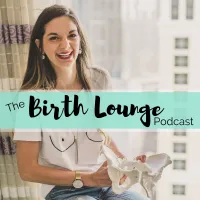Episode Description
In this episode of The Birth Lounge Podcast, HeHe sits down with clinical pharmacist Dr. Michaela Wachal to unpack the controversy surrounding Tylenol (acetaminophen) use in pregnancy and its potential links to autism and other neurodevelopmental concerns.
Together, they dive into what the research actually says (and doesn’t say), why transparency and informed consent are so important, and how to navigate decisions around medications in pregnancy with confidence. Dr. Wachal also highlights the bigger picture, like how genetics, environmental toxins, and even maternal stress can play a role in outcomes, and why caring for yourself is just as critical as any prescription.
This conversation is packed with nuance, evidence, and practical takeaways to help you feel informed, empowered, and ready to advocate for yourself as you make decisions about your pregnancy care.
00:00 Introduction and Media Misrepresentation
01:05 Personal Story and Birth Lounge App
02:16 Empowering Prenatal Conversations
05:26 Emergency Use Authorization Episode
07:34 Interview with Dr. Michaela Wachal
09:14 Medication Safety in Pregnancy
12:37 Pharmaceutical Industry Failures
15:20 Personal Journey and Advocacy
18:55 Questioning Medical Norms
21:15 Tylenol and Toxins
23:34 Aluminum in Vaccines
27:32 The Importance of Transparency
37:05 Advocating for Education and Understanding
37:51 The Power of Asking Questions
40:21 Nesting and Preparing for Baby
43:17 Managing Fevers During Pregnancy
52:01 Environmental Toxins and Health
01:00:41 Therapies and Support for Children on the Spectrum
01:09:27 Final Thoughts and Encouragement
Guest Bio:
Michaela Wachal, PharmD, CSP, is a clinical pharmacist, Certified Specialty Pharmacist, and Clinical Accreditation Manager with nearly a decade of experience in specialty pharmacy. She holds a Doctor of Pharmacy degree from the University of Nebraska Medical Center and a Bachelor of Science in Biochemistry from Doane University. Throughout her career, she’s specialized in complex conditions including oncology, fertility, endocrinology, immunology, mental health, and inflammatory diseases—always with a passion for improving patient care, optimizing healthcare systems, and empowering women in medicine.
Michaela is also a mom of three, including one child with autism, ADHD, and anxiety, which ignited her deep interest in neurodiversity, integrative health, and individualized medicine. After navigating her own family’s challenges, she began researching functional and evidence-based approaches to support children and families living with complex needs. Online, Michaela shares insights from scientific studies on autism, ADHD, vaccines, autoimmune conditions, toxins, and more, always with a focus on helping parents make informed, evidence-based choices.
Her work blends professional expertise with personal passion, making her a trusted voice in both the pharmacy world and the parenting community.
INSTAGRAM:
BIRTH EDUCATION:
Join The Birth Lounge here for judgment-free childbirth education that prepares you for an informed birth and how to confidently navigate hospital policy to have a trauma-free labor experience!
Download The Birth Lounge App for birth & postpartum prep delivered straight to your phone!
RESEARCH MENTIONED:
- 2021 there's a call for action published supported by 91 scientists, clinicians and public health professionals across the globe recommended that pregnant women should be cautioned at the beginning of pregnancy to forego APAP unless it is medically indicated and to minimize the exposure by using the lowest effective dose for shortest possible time https://pubmed.ncbi.nlm.nih.gov/34556849/
- Boston Birth cohort published in 2020 looked at acetaminophen metabolites in cord blood samples collected at birth and unchanged acetaminophen levels were detected in all cord plasma samples and acetaminophen burden was associated with higher odds of ADHD and ASD daignosis there was a 2.3 to 3.5 increased risk for ADHD and 1.6 to 4.1 increased risk for ASD https://pubmed.ncbi.nlm.nih.gov/31664451/
- Recently in August Harvard did an analysis using the Navigation Guide methodology that supports evidence consistent with an association between acetaminophen exposure during pregnancy and increased incidence of Neurodevelopmental disorders. This included 46 studies with 27 reporting positive associations with the higher quality studies more likely to show positive correlations
- https://ehjournal.biomedcentral.com/articles/10.1186/s12940-025-01208-0
- Nurses Health Study https://pubmed.ncbi.nlm.nih.gov/30923825/
- Spanish birth cohort where acetaminophen exposure was associated with more hyperactivity/impulsivity https://pubmed.ncbi.nlm.nih.gov/27353198/
- In 2018 there was a review that showed that 9 prospective cohort studies that all suggested an association between prenatal APAP exposure and neurodevelopmental outcomes - ADHD, ASD or lower IQ and longer duration was associated with increased risk https://pubmed.ncbi.nlm.nih.gov/29341895/
- 2022 a prospective cohort study in Pennsylvania looked at 2,423 moms using data and children who were exposed to APAP during pregnancy scored higher for child behaviors, sleep problems and attention problems https://pubmed.ncbi.nlm.nih.gov/36170224/
Keywords: Tylenol pregnancy, acetaminophen pregnancy, Tylenol autism risk, pregnancy medication safety, prenatal care, evidence-based pregnancy, maternal health, neurodevelopment, pregnancy decision making, informed consent pregnancy, pregnancy medications, Dr. Michaela Wachal, Birth Lounge podcast, pregnancy self-care, pregnancy toxins
